Report on Employability Skills and Performance at National Trust
VerifiedAdded on 2021/02/20
|18
|6185
|30
Report
AI Summary
This report examines employability skills within the context of the National Trust, focusing on the role of a Membership and Visitor Welcome Manager. It details the individual's responsibilities, performance objectives, and self-assessment of skills, including decision-making and adaptability. The report provides recommendations for improvement, such as self-learning and training sessions, and discusses motivational techniques like Maslow's Hierarchy of Needs and Vroom's Expectancy Theory. Furthermore, it analyzes team roles, dynamics, and alternative approaches to achieving shared goals. The report also outlines tools and methods for problem-solving, culminating in a strategy to address labor turnover and its potential impact on the business. This assignment showcases a comprehensive understanding of employability skills and their practical application in a real-world organizational setting.
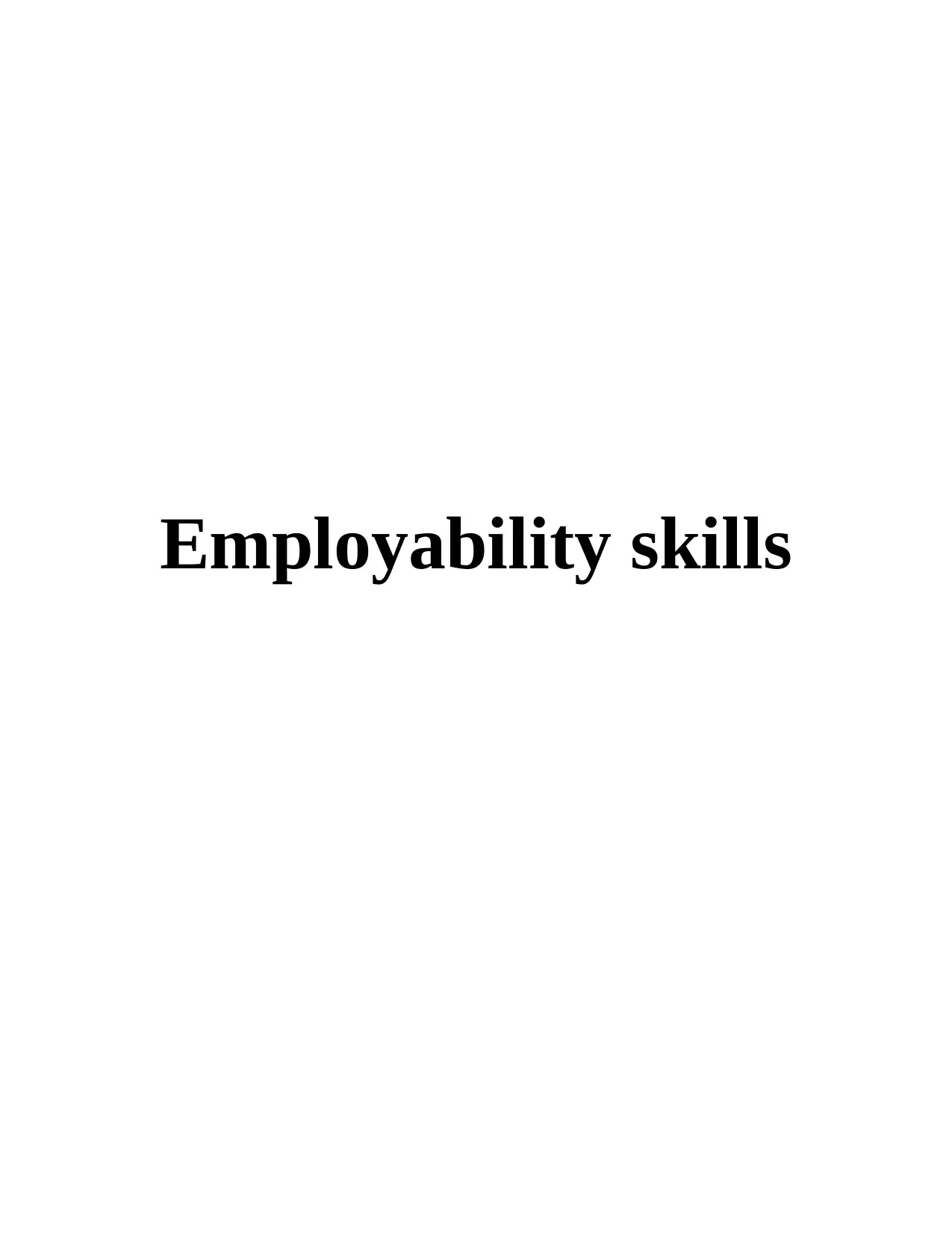
Employability skills
Paraphrase This Document
Need a fresh take? Get an instant paraphrase of this document with our AI Paraphraser
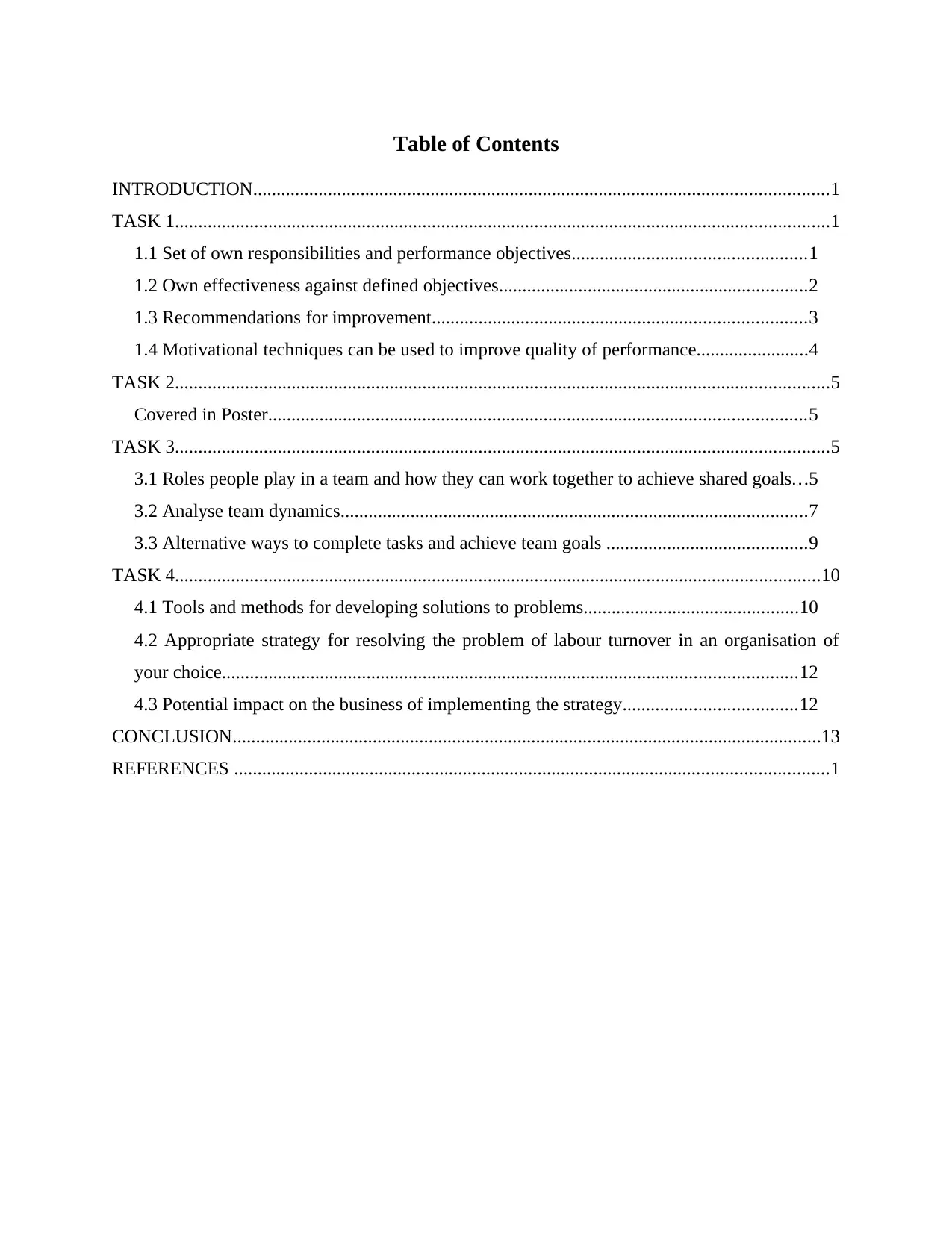
Table of Contents
INTRODUCTION...........................................................................................................................1
TASK 1............................................................................................................................................1
1.1 Set of own responsibilities and performance objectives..................................................1
1.2 Own effectiveness against defined objectives..................................................................2
1.3 Recommendations for improvement................................................................................3
1.4 Motivational techniques can be used to improve quality of performance........................4
TASK 2............................................................................................................................................5
Covered in Poster...................................................................................................................5
TASK 3............................................................................................................................................5
3.1 Roles people play in a team and how they can work together to achieve shared goals...5
3.2 Analyse team dynamics....................................................................................................7
3.3 Alternative ways to complete tasks and achieve team goals ...........................................9
TASK 4..........................................................................................................................................10
4.1 Tools and methods for developing solutions to problems..............................................10
4.2 Appropriate strategy for resolving the problem of labour turnover in an organisation of
your choice...........................................................................................................................12
4.3 Potential impact on the business of implementing the strategy.....................................12
CONCLUSION..............................................................................................................................13
REFERENCES ...............................................................................................................................1
INTRODUCTION...........................................................................................................................1
TASK 1............................................................................................................................................1
1.1 Set of own responsibilities and performance objectives..................................................1
1.2 Own effectiveness against defined objectives..................................................................2
1.3 Recommendations for improvement................................................................................3
1.4 Motivational techniques can be used to improve quality of performance........................4
TASK 2............................................................................................................................................5
Covered in Poster...................................................................................................................5
TASK 3............................................................................................................................................5
3.1 Roles people play in a team and how they can work together to achieve shared goals...5
3.2 Analyse team dynamics....................................................................................................7
3.3 Alternative ways to complete tasks and achieve team goals ...........................................9
TASK 4..........................................................................................................................................10
4.1 Tools and methods for developing solutions to problems..............................................10
4.2 Appropriate strategy for resolving the problem of labour turnover in an organisation of
your choice...........................................................................................................................12
4.3 Potential impact on the business of implementing the strategy.....................................12
CONCLUSION..............................................................................................................................13
REFERENCES ...............................................................................................................................1
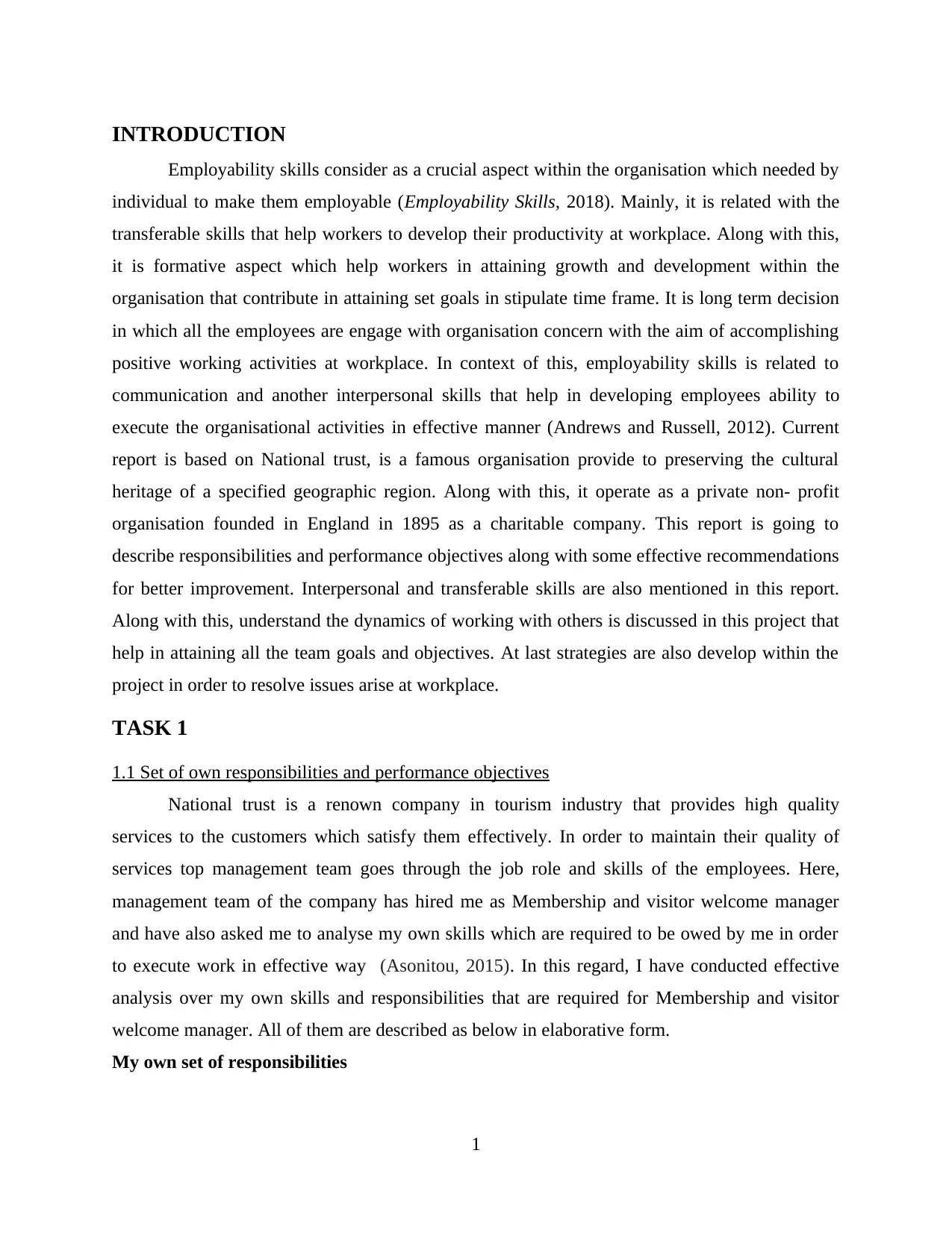
INTRODUCTION
Employability skills consider as a crucial aspect within the organisation which needed by
individual to make them employable (Employability Skills, 2018). Mainly, it is related with the
transferable skills that help workers to develop their productivity at workplace. Along with this,
it is formative aspect which help workers in attaining growth and development within the
organisation that contribute in attaining set goals in stipulate time frame. It is long term decision
in which all the employees are engage with organisation concern with the aim of accomplishing
positive working activities at workplace. In context of this, employability skills is related to
communication and another interpersonal skills that help in developing employees ability to
execute the organisational activities in effective manner (Andrews and Russell, 2012). Current
report is based on National trust, is a famous organisation provide to preserving the cultural
heritage of a specified geographic region. Along with this, it operate as a private non- profit
organisation founded in England in 1895 as a charitable company. This report is going to
describe responsibilities and performance objectives along with some effective recommendations
for better improvement. Interpersonal and transferable skills are also mentioned in this report.
Along with this, understand the dynamics of working with others is discussed in this project that
help in attaining all the team goals and objectives. At last strategies are also develop within the
project in order to resolve issues arise at workplace.
TASK 1
1.1 Set of own responsibilities and performance objectives
National trust is a renown company in tourism industry that provides high quality
services to the customers which satisfy them effectively. In order to maintain their quality of
services top management team goes through the job role and skills of the employees. Here,
management team of the company has hired me as Membership and visitor welcome manager
and have also asked me to analyse my own skills which are required to be owed by me in order
to execute work in effective way (Asonitou, 2015). In this regard, I have conducted effective
analysis over my own skills and responsibilities that are required for Membership and visitor
welcome manager. All of them are described as below in elaborative form.
My own set of responsibilities
1
Employability skills consider as a crucial aspect within the organisation which needed by
individual to make them employable (Employability Skills, 2018). Mainly, it is related with the
transferable skills that help workers to develop their productivity at workplace. Along with this,
it is formative aspect which help workers in attaining growth and development within the
organisation that contribute in attaining set goals in stipulate time frame. It is long term decision
in which all the employees are engage with organisation concern with the aim of accomplishing
positive working activities at workplace. In context of this, employability skills is related to
communication and another interpersonal skills that help in developing employees ability to
execute the organisational activities in effective manner (Andrews and Russell, 2012). Current
report is based on National trust, is a famous organisation provide to preserving the cultural
heritage of a specified geographic region. Along with this, it operate as a private non- profit
organisation founded in England in 1895 as a charitable company. This report is going to
describe responsibilities and performance objectives along with some effective recommendations
for better improvement. Interpersonal and transferable skills are also mentioned in this report.
Along with this, understand the dynamics of working with others is discussed in this project that
help in attaining all the team goals and objectives. At last strategies are also develop within the
project in order to resolve issues arise at workplace.
TASK 1
1.1 Set of own responsibilities and performance objectives
National trust is a renown company in tourism industry that provides high quality
services to the customers which satisfy them effectively. In order to maintain their quality of
services top management team goes through the job role and skills of the employees. Here,
management team of the company has hired me as Membership and visitor welcome manager
and have also asked me to analyse my own skills which are required to be owed by me in order
to execute work in effective way (Asonitou, 2015). In this regard, I have conducted effective
analysis over my own skills and responsibilities that are required for Membership and visitor
welcome manager. All of them are described as below in elaborative form.
My own set of responsibilities
1
⊘ This is a preview!⊘
Do you want full access?
Subscribe today to unlock all pages.

Trusted by 1+ million students worldwide
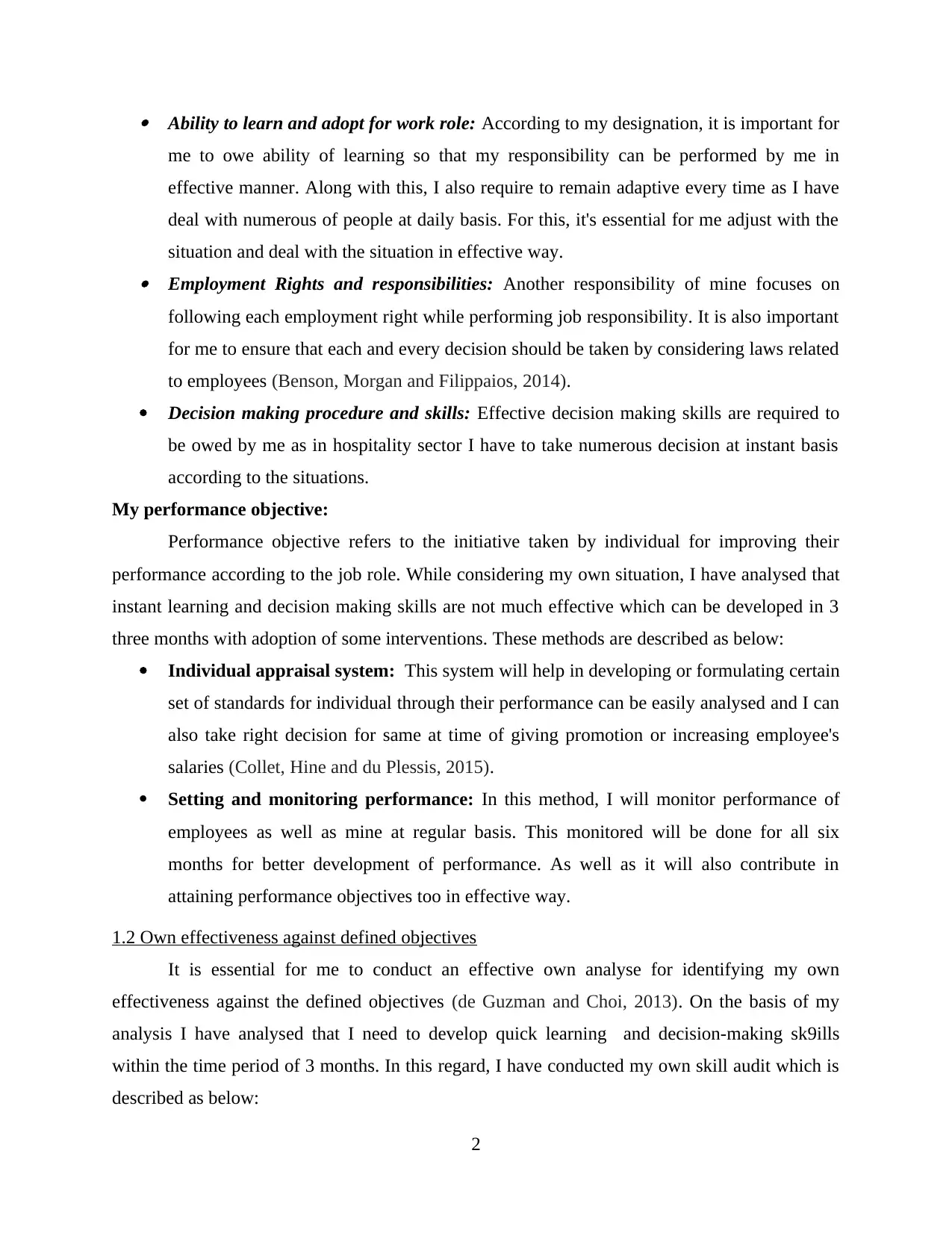
Ability to learn and adopt for work role: According to my designation, it is important for
me to owe ability of learning so that my responsibility can be performed by me in
effective manner. Along with this, I also require to remain adaptive every time as I have
deal with numerous of people at daily basis. For this, it's essential for me adjust with the
situation and deal with the situation in effective way. Employment Rights and responsibilities: Another responsibility of mine focuses on
following each employment right while performing job responsibility. It is also important
for me to ensure that each and every decision should be taken by considering laws related
to employees (Benson, Morgan and Filippaios, 2014).
Decision making procedure and skills: Effective decision making skills are required to
be owed by me as in hospitality sector I have to take numerous decision at instant basis
according to the situations.
My performance objective:
Performance objective refers to the initiative taken by individual for improving their
performance according to the job role. While considering my own situation, I have analysed that
instant learning and decision making skills are not much effective which can be developed in 3
three months with adoption of some interventions. These methods are described as below:
Individual appraisal system: This system will help in developing or formulating certain
set of standards for individual through their performance can be easily analysed and I can
also take right decision for same at time of giving promotion or increasing employee's
salaries (Collet, Hine and du Plessis, 2015).
Setting and monitoring performance: In this method, I will monitor performance of
employees as well as mine at regular basis. This monitored will be done for all six
months for better development of performance. As well as it will also contribute in
attaining performance objectives too in effective way.
1.2 Own effectiveness against defined objectives
It is essential for me to conduct an effective own analyse for identifying my own
effectiveness against the defined objectives (de Guzman and Choi, 2013). On the basis of my
analysis I have analysed that I need to develop quick learning and decision-making sk9ills
within the time period of 3 months. In this regard, I have conducted my own skill audit which is
described as below:
2
me to owe ability of learning so that my responsibility can be performed by me in
effective manner. Along with this, I also require to remain adaptive every time as I have
deal with numerous of people at daily basis. For this, it's essential for me adjust with the
situation and deal with the situation in effective way. Employment Rights and responsibilities: Another responsibility of mine focuses on
following each employment right while performing job responsibility. It is also important
for me to ensure that each and every decision should be taken by considering laws related
to employees (Benson, Morgan and Filippaios, 2014).
Decision making procedure and skills: Effective decision making skills are required to
be owed by me as in hospitality sector I have to take numerous decision at instant basis
according to the situations.
My performance objective:
Performance objective refers to the initiative taken by individual for improving their
performance according to the job role. While considering my own situation, I have analysed that
instant learning and decision making skills are not much effective which can be developed in 3
three months with adoption of some interventions. These methods are described as below:
Individual appraisal system: This system will help in developing or formulating certain
set of standards for individual through their performance can be easily analysed and I can
also take right decision for same at time of giving promotion or increasing employee's
salaries (Collet, Hine and du Plessis, 2015).
Setting and monitoring performance: In this method, I will monitor performance of
employees as well as mine at regular basis. This monitored will be done for all six
months for better development of performance. As well as it will also contribute in
attaining performance objectives too in effective way.
1.2 Own effectiveness against defined objectives
It is essential for me to conduct an effective own analyse for identifying my own
effectiveness against the defined objectives (de Guzman and Choi, 2013). On the basis of my
analysis I have analysed that I need to develop quick learning and decision-making sk9ills
within the time period of 3 months. In this regard, I have conducted my own skill audit which is
described as below:
2
Paraphrase This Document
Need a fresh take? Get an instant paraphrase of this document with our AI Paraphraser
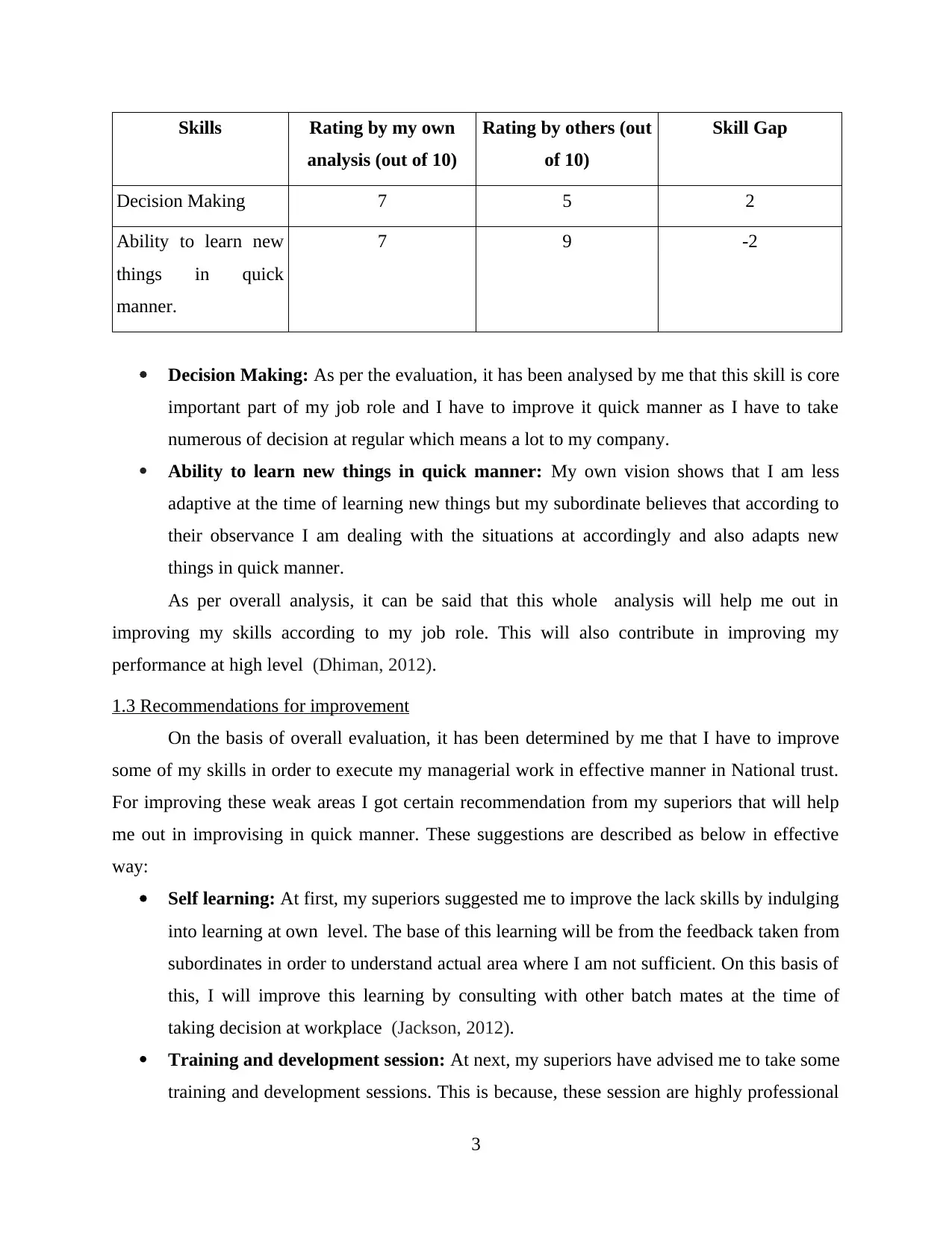
Skills Rating by my own
analysis (out of 10)
Rating by others (out
of 10)
Skill Gap
Decision Making 7 5 2
Ability to learn new
things in quick
manner.
7 9 -2
Decision Making: As per the evaluation, it has been analysed by me that this skill is core
important part of my job role and I have to improve it quick manner as I have to take
numerous of decision at regular which means a lot to my company.
Ability to learn new things in quick manner: My own vision shows that I am less
adaptive at the time of learning new things but my subordinate believes that according to
their observance I am dealing with the situations at accordingly and also adapts new
things in quick manner.
As per overall analysis, it can be said that this whole analysis will help me out in
improving my skills according to my job role. This will also contribute in improving my
performance at high level (Dhiman, 2012).
1.3 Recommendations for improvement
On the basis of overall evaluation, it has been determined by me that I have to improve
some of my skills in order to execute my managerial work in effective manner in National trust.
For improving these weak areas I got certain recommendation from my superiors that will help
me out in improvising in quick manner. These suggestions are described as below in effective
way:
Self learning: At first, my superiors suggested me to improve the lack skills by indulging
into learning at own level. The base of this learning will be from the feedback taken from
subordinates in order to understand actual area where I am not sufficient. On this basis of
this, I will improve this learning by consulting with other batch mates at the time of
taking decision at workplace (Jackson, 2012).
Training and development session: At next, my superiors have advised me to take some
training and development sessions. This is because, these session are highly professional
3
analysis (out of 10)
Rating by others (out
of 10)
Skill Gap
Decision Making 7 5 2
Ability to learn new
things in quick
manner.
7 9 -2
Decision Making: As per the evaluation, it has been analysed by me that this skill is core
important part of my job role and I have to improve it quick manner as I have to take
numerous of decision at regular which means a lot to my company.
Ability to learn new things in quick manner: My own vision shows that I am less
adaptive at the time of learning new things but my subordinate believes that according to
their observance I am dealing with the situations at accordingly and also adapts new
things in quick manner.
As per overall analysis, it can be said that this whole analysis will help me out in
improving my skills according to my job role. This will also contribute in improving my
performance at high level (Dhiman, 2012).
1.3 Recommendations for improvement
On the basis of overall evaluation, it has been determined by me that I have to improve
some of my skills in order to execute my managerial work in effective manner in National trust.
For improving these weak areas I got certain recommendation from my superiors that will help
me out in improvising in quick manner. These suggestions are described as below in effective
way:
Self learning: At first, my superiors suggested me to improve the lack skills by indulging
into learning at own level. The base of this learning will be from the feedback taken from
subordinates in order to understand actual area where I am not sufficient. On this basis of
this, I will improve this learning by consulting with other batch mates at the time of
taking decision at workplace (Jackson, 2012).
Training and development session: At next, my superiors have advised me to take some
training and development sessions. This is because, these session are highly professional
3
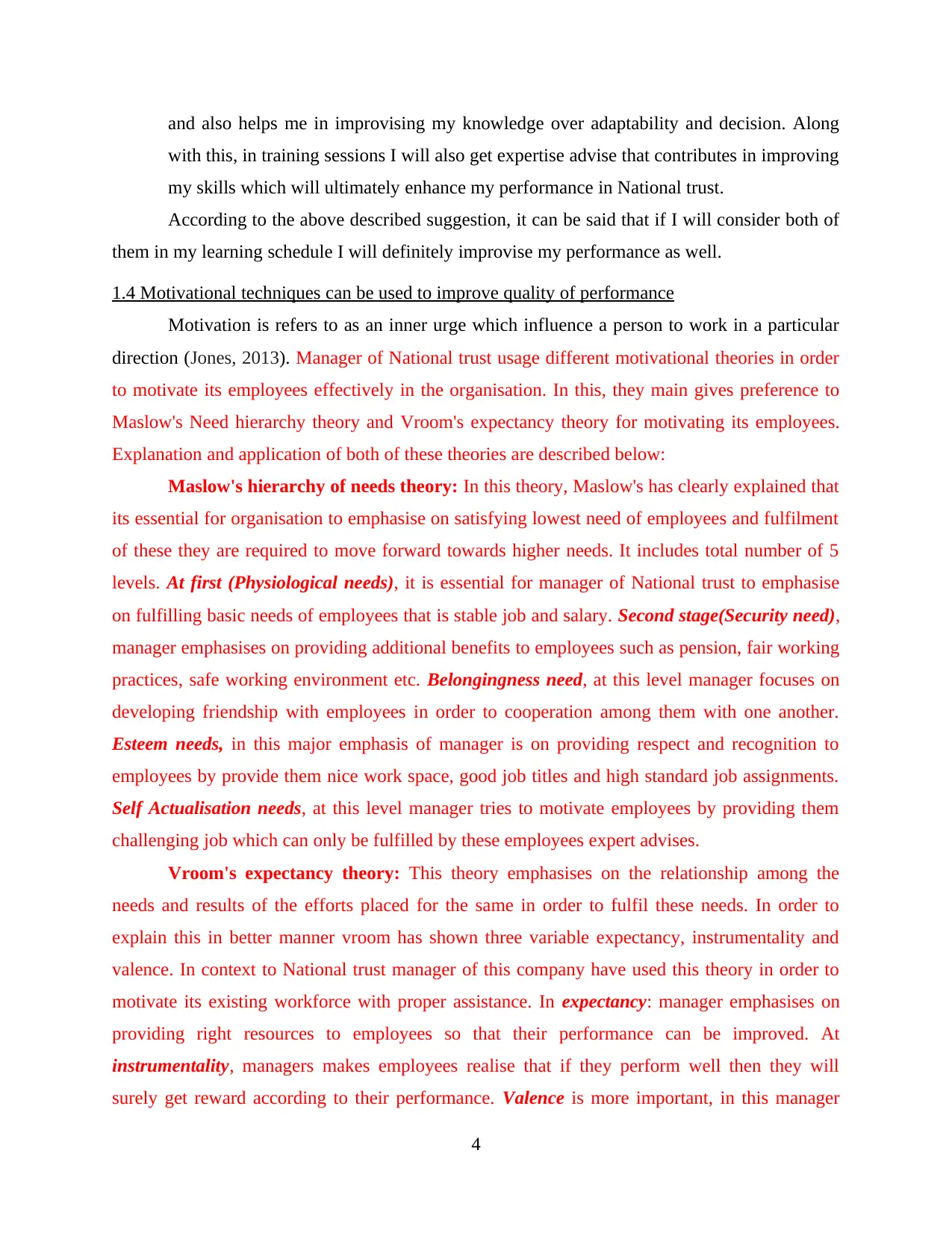
and also helps me in improvising my knowledge over adaptability and decision. Along
with this, in training sessions I will also get expertise advise that contributes in improving
my skills which will ultimately enhance my performance in National trust.
According to the above described suggestion, it can be said that if I will consider both of
them in my learning schedule I will definitely improvise my performance as well.
1.4 Motivational techniques can be used to improve quality of performance
Motivation is refers to as an inner urge which influence a person to work in a particular
direction (Jones, 2013). Manager of National trust usage different motivational theories in order
to motivate its employees effectively in the organisation. In this, they main gives preference to
Maslow's Need hierarchy theory and Vroom's expectancy theory for motivating its employees.
Explanation and application of both of these theories are described below:
Maslow's hierarchy of needs theory: In this theory, Maslow's has clearly explained that
its essential for organisation to emphasise on satisfying lowest need of employees and fulfilment
of these they are required to move forward towards higher needs. It includes total number of 5
levels. At first (Physiological needs), it is essential for manager of National trust to emphasise
on fulfilling basic needs of employees that is stable job and salary. Second stage(Security need),
manager emphasises on providing additional benefits to employees such as pension, fair working
practices, safe working environment etc. Belongingness need, at this level manager focuses on
developing friendship with employees in order to cooperation among them with one another.
Esteem needs, in this major emphasis of manager is on providing respect and recognition to
employees by provide them nice work space, good job titles and high standard job assignments.
Self Actualisation needs, at this level manager tries to motivate employees by providing them
challenging job which can only be fulfilled by these employees expert advises.
Vroom's expectancy theory: This theory emphasises on the relationship among the
needs and results of the efforts placed for the same in order to fulfil these needs. In order to
explain this in better manner vroom has shown three variable expectancy, instrumentality and
valence. In context to National trust manager of this company have used this theory in order to
motivate its existing workforce with proper assistance. In expectancy: manager emphasises on
providing right resources to employees so that their performance can be improved. At
instrumentality, managers makes employees realise that if they perform well then they will
surely get reward according to their performance. Valence is more important, in this manager
4
with this, in training sessions I will also get expertise advise that contributes in improving
my skills which will ultimately enhance my performance in National trust.
According to the above described suggestion, it can be said that if I will consider both of
them in my learning schedule I will definitely improvise my performance as well.
1.4 Motivational techniques can be used to improve quality of performance
Motivation is refers to as an inner urge which influence a person to work in a particular
direction (Jones, 2013). Manager of National trust usage different motivational theories in order
to motivate its employees effectively in the organisation. In this, they main gives preference to
Maslow's Need hierarchy theory and Vroom's expectancy theory for motivating its employees.
Explanation and application of both of these theories are described below:
Maslow's hierarchy of needs theory: In this theory, Maslow's has clearly explained that
its essential for organisation to emphasise on satisfying lowest need of employees and fulfilment
of these they are required to move forward towards higher needs. It includes total number of 5
levels. At first (Physiological needs), it is essential for manager of National trust to emphasise
on fulfilling basic needs of employees that is stable job and salary. Second stage(Security need),
manager emphasises on providing additional benefits to employees such as pension, fair working
practices, safe working environment etc. Belongingness need, at this level manager focuses on
developing friendship with employees in order to cooperation among them with one another.
Esteem needs, in this major emphasis of manager is on providing respect and recognition to
employees by provide them nice work space, good job titles and high standard job assignments.
Self Actualisation needs, at this level manager tries to motivate employees by providing them
challenging job which can only be fulfilled by these employees expert advises.
Vroom's expectancy theory: This theory emphasises on the relationship among the
needs and results of the efforts placed for the same in order to fulfil these needs. In order to
explain this in better manner vroom has shown three variable expectancy, instrumentality and
valence. In context to National trust manager of this company have used this theory in order to
motivate its existing workforce with proper assistance. In expectancy: manager emphasises on
providing right resources to employees so that their performance can be improved. At
instrumentality, managers makes employees realise that if they perform well then they will
surely get reward according to their performance. Valence is more important, in this manager
4
⊘ This is a preview!⊘
Do you want full access?
Subscribe today to unlock all pages.

Trusted by 1+ million students worldwide
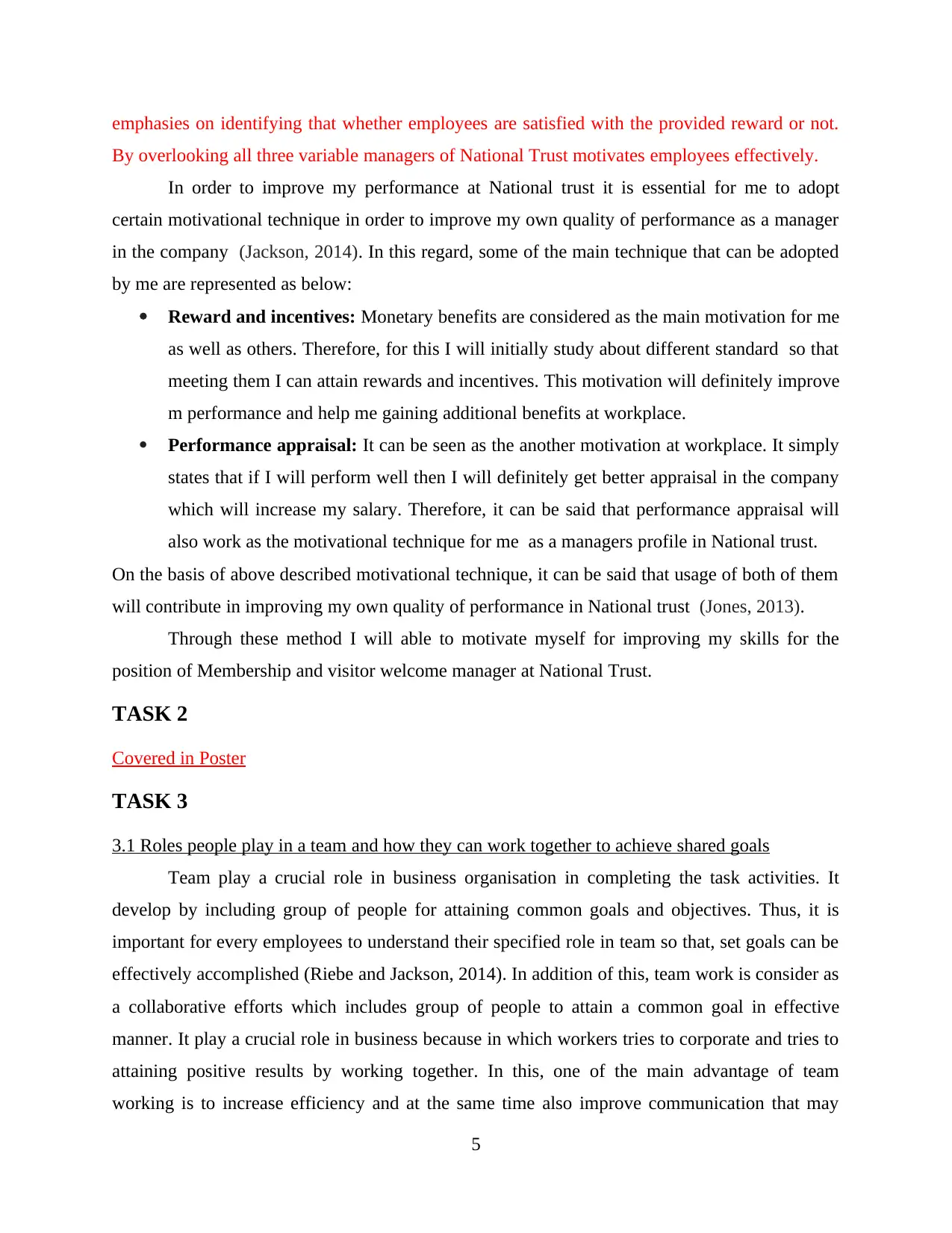
emphasies on identifying that whether employees are satisfied with the provided reward or not.
By overlooking all three variable managers of National Trust motivates employees effectively.
In order to improve my performance at National trust it is essential for me to adopt
certain motivational technique in order to improve my own quality of performance as a manager
in the company (Jackson, 2014). In this regard, some of the main technique that can be adopted
by me are represented as below:
Reward and incentives: Monetary benefits are considered as the main motivation for me
as well as others. Therefore, for this I will initially study about different standard so that
meeting them I can attain rewards and incentives. This motivation will definitely improve
m performance and help me gaining additional benefits at workplace.
Performance appraisal: It can be seen as the another motivation at workplace. It simply
states that if I will perform well then I will definitely get better appraisal in the company
which will increase my salary. Therefore, it can be said that performance appraisal will
also work as the motivational technique for me as a managers profile in National trust.
On the basis of above described motivational technique, it can be said that usage of both of them
will contribute in improving my own quality of performance in National trust (Jones, 2013).
Through these method I will able to motivate myself for improving my skills for the
position of Membership and visitor welcome manager at National Trust.
TASK 2
Covered in Poster
TASK 3
3.1 Roles people play in a team and how they can work together to achieve shared goals
Team play a crucial role in business organisation in completing the task activities. It
develop by including group of people for attaining common goals and objectives. Thus, it is
important for every employees to understand their specified role in team so that, set goals can be
effectively accomplished (Riebe and Jackson, 2014). In addition of this, team work is consider as
a collaborative efforts which includes group of people to attain a common goal in effective
manner. It play a crucial role in business because in which workers tries to corporate and tries to
attaining positive results by working together. In this, one of the main advantage of team
working is to increase efficiency and at the same time also improve communication that may
5
By overlooking all three variable managers of National Trust motivates employees effectively.
In order to improve my performance at National trust it is essential for me to adopt
certain motivational technique in order to improve my own quality of performance as a manager
in the company (Jackson, 2014). In this regard, some of the main technique that can be adopted
by me are represented as below:
Reward and incentives: Monetary benefits are considered as the main motivation for me
as well as others. Therefore, for this I will initially study about different standard so that
meeting them I can attain rewards and incentives. This motivation will definitely improve
m performance and help me gaining additional benefits at workplace.
Performance appraisal: It can be seen as the another motivation at workplace. It simply
states that if I will perform well then I will definitely get better appraisal in the company
which will increase my salary. Therefore, it can be said that performance appraisal will
also work as the motivational technique for me as a managers profile in National trust.
On the basis of above described motivational technique, it can be said that usage of both of them
will contribute in improving my own quality of performance in National trust (Jones, 2013).
Through these method I will able to motivate myself for improving my skills for the
position of Membership and visitor welcome manager at National Trust.
TASK 2
Covered in Poster
TASK 3
3.1 Roles people play in a team and how they can work together to achieve shared goals
Team play a crucial role in business organisation in completing the task activities. It
develop by including group of people for attaining common goals and objectives. Thus, it is
important for every employees to understand their specified role in team so that, set goals can be
effectively accomplished (Riebe and Jackson, 2014). In addition of this, team work is consider as
a collaborative efforts which includes group of people to attain a common goal in effective
manner. It play a crucial role in business because in which workers tries to corporate and tries to
attaining positive results by working together. In this, one of the main advantage of team
working is to increase efficiency and at the same time also improve communication that may
5
Paraphrase This Document
Need a fresh take? Get an instant paraphrase of this document with our AI Paraphraser
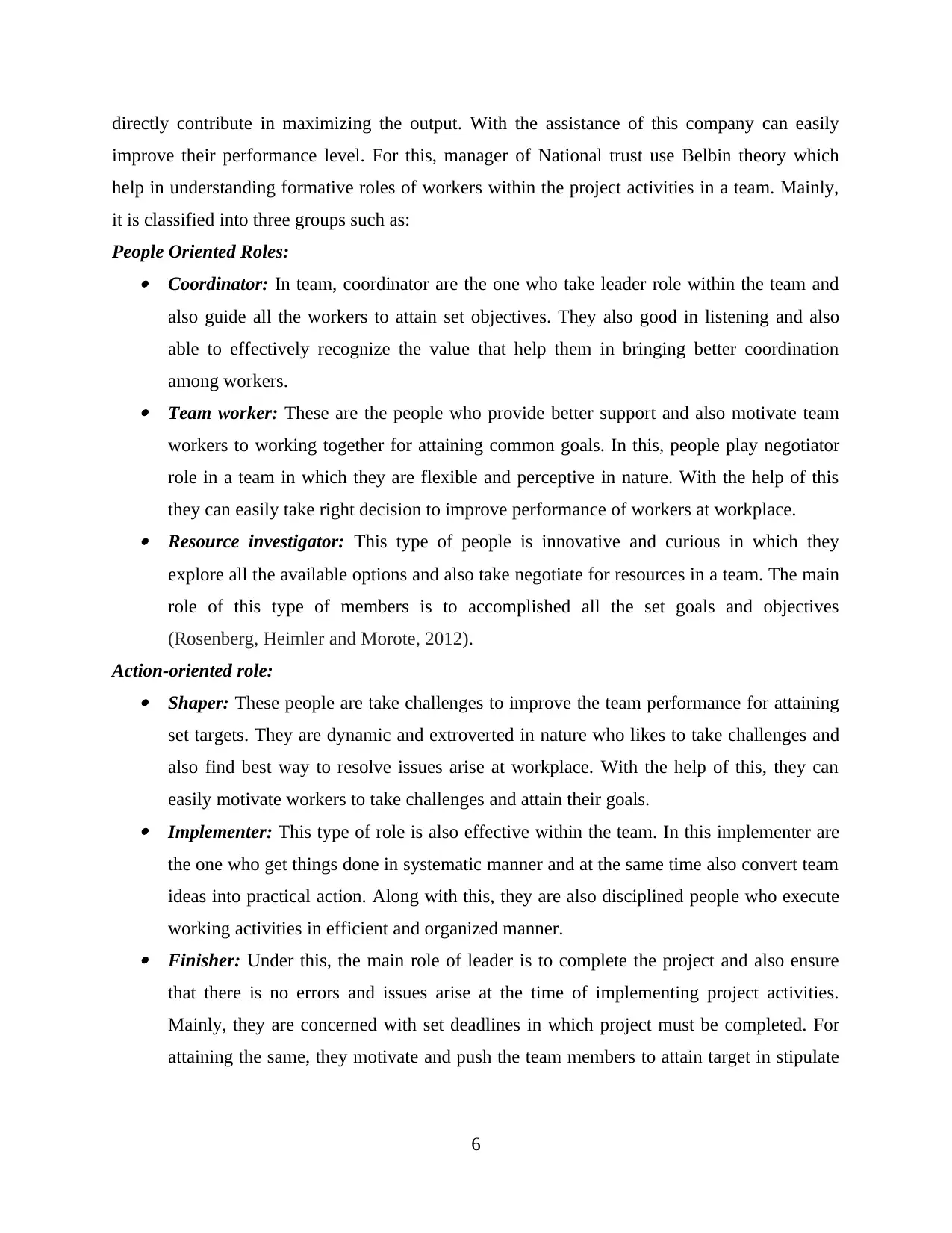
directly contribute in maximizing the output. With the assistance of this company can easily
improve their performance level. For this, manager of National trust use Belbin theory which
help in understanding formative roles of workers within the project activities in a team. Mainly,
it is classified into three groups such as:
People Oriented Roles: Coordinator: In team, coordinator are the one who take leader role within the team and
also guide all the workers to attain set objectives. They also good in listening and also
able to effectively recognize the value that help them in bringing better coordination
among workers. Team worker: These are the people who provide better support and also motivate team
workers to working together for attaining common goals. In this, people play negotiator
role in a team in which they are flexible and perceptive in nature. With the help of this
they can easily take right decision to improve performance of workers at workplace. Resource investigator: This type of people is innovative and curious in which they
explore all the available options and also take negotiate for resources in a team. The main
role of this type of members is to accomplished all the set goals and objectives
(Rosenberg, Heimler and Morote, 2012).
Action-oriented role: Shaper: These people are take challenges to improve the team performance for attaining
set targets. They are dynamic and extroverted in nature who likes to take challenges and
also find best way to resolve issues arise at workplace. With the help of this, they can
easily motivate workers to take challenges and attain their goals. Implementer: This type of role is also effective within the team. In this implementer are
the one who get things done in systematic manner and at the same time also convert team
ideas into practical action. Along with this, they are also disciplined people who execute
working activities in efficient and organized manner. Finisher: Under this, the main role of leader is to complete the project and also ensure
that there is no errors and issues arise at the time of implementing project activities.
Mainly, they are concerned with set deadlines in which project must be completed. For
attaining the same, they motivate and push the team members to attain target in stipulate
6
improve their performance level. For this, manager of National trust use Belbin theory which
help in understanding formative roles of workers within the project activities in a team. Mainly,
it is classified into three groups such as:
People Oriented Roles: Coordinator: In team, coordinator are the one who take leader role within the team and
also guide all the workers to attain set objectives. They also good in listening and also
able to effectively recognize the value that help them in bringing better coordination
among workers. Team worker: These are the people who provide better support and also motivate team
workers to working together for attaining common goals. In this, people play negotiator
role in a team in which they are flexible and perceptive in nature. With the help of this
they can easily take right decision to improve performance of workers at workplace. Resource investigator: This type of people is innovative and curious in which they
explore all the available options and also take negotiate for resources in a team. The main
role of this type of members is to accomplished all the set goals and objectives
(Rosenberg, Heimler and Morote, 2012).
Action-oriented role: Shaper: These people are take challenges to improve the team performance for attaining
set targets. They are dynamic and extroverted in nature who likes to take challenges and
also find best way to resolve issues arise at workplace. With the help of this, they can
easily motivate workers to take challenges and attain their goals. Implementer: This type of role is also effective within the team. In this implementer are
the one who get things done in systematic manner and at the same time also convert team
ideas into practical action. Along with this, they are also disciplined people who execute
working activities in efficient and organized manner. Finisher: Under this, the main role of leader is to complete the project and also ensure
that there is no errors and issues arise at the time of implementing project activities.
Mainly, they are concerned with set deadlines in which project must be completed. For
attaining the same, they motivate and push the team members to attain target in stipulate
6
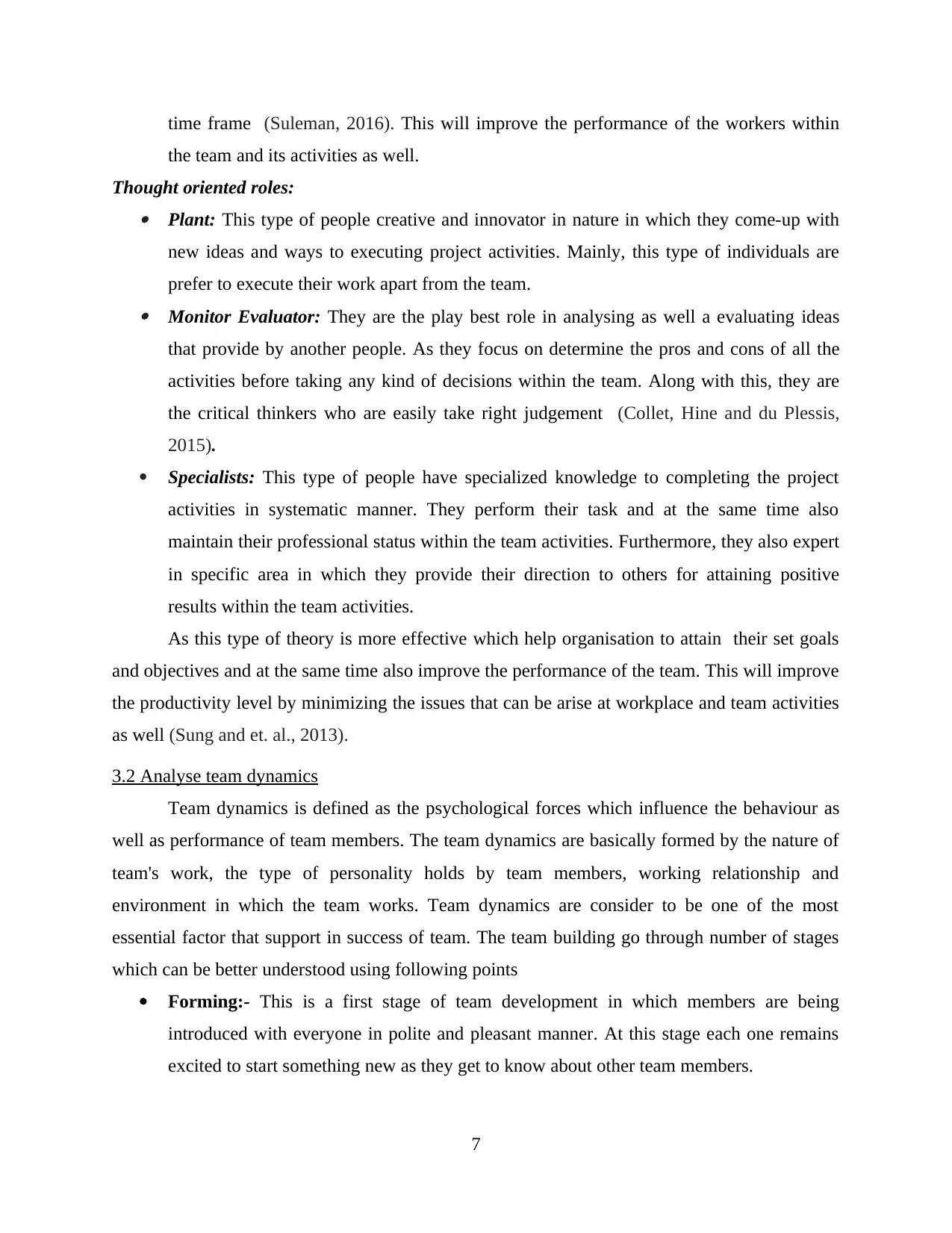
time frame (Suleman, 2016). This will improve the performance of the workers within
the team and its activities as well.
Thought oriented roles: Plant: This type of people creative and innovator in nature in which they come-up with
new ideas and ways to executing project activities. Mainly, this type of individuals are
prefer to execute their work apart from the team. Monitor Evaluator: They are the play best role in analysing as well a evaluating ideas
that provide by another people. As they focus on determine the pros and cons of all the
activities before taking any kind of decisions within the team. Along with this, they are
the critical thinkers who are easily take right judgement (Collet, Hine and du Plessis,
2015).
Specialists: This type of people have specialized knowledge to completing the project
activities in systematic manner. They perform their task and at the same time also
maintain their professional status within the team activities. Furthermore, they also expert
in specific area in which they provide their direction to others for attaining positive
results within the team activities.
As this type of theory is more effective which help organisation to attain their set goals
and objectives and at the same time also improve the performance of the team. This will improve
the productivity level by minimizing the issues that can be arise at workplace and team activities
as well (Sung and et. al., 2013).
3.2 Analyse team dynamics
Team dynamics is defined as the psychological forces which influence the behaviour as
well as performance of team members. The team dynamics are basically formed by the nature of
team's work, the type of personality holds by team members, working relationship and
environment in which the team works. Team dynamics are consider to be one of the most
essential factor that support in success of team. The team building go through number of stages
which can be better understood using following points
Forming:- This is a first stage of team development in which members are being
introduced with everyone in polite and pleasant manner. At this stage each one remains
excited to start something new as they get to know about other team members.
7
the team and its activities as well.
Thought oriented roles: Plant: This type of people creative and innovator in nature in which they come-up with
new ideas and ways to executing project activities. Mainly, this type of individuals are
prefer to execute their work apart from the team. Monitor Evaluator: They are the play best role in analysing as well a evaluating ideas
that provide by another people. As they focus on determine the pros and cons of all the
activities before taking any kind of decisions within the team. Along with this, they are
the critical thinkers who are easily take right judgement (Collet, Hine and du Plessis,
2015).
Specialists: This type of people have specialized knowledge to completing the project
activities in systematic manner. They perform their task and at the same time also
maintain their professional status within the team activities. Furthermore, they also expert
in specific area in which they provide their direction to others for attaining positive
results within the team activities.
As this type of theory is more effective which help organisation to attain their set goals
and objectives and at the same time also improve the performance of the team. This will improve
the productivity level by minimizing the issues that can be arise at workplace and team activities
as well (Sung and et. al., 2013).
3.2 Analyse team dynamics
Team dynamics is defined as the psychological forces which influence the behaviour as
well as performance of team members. The team dynamics are basically formed by the nature of
team's work, the type of personality holds by team members, working relationship and
environment in which the team works. Team dynamics are consider to be one of the most
essential factor that support in success of team. The team building go through number of stages
which can be better understood using following points
Forming:- This is a first stage of team development in which members are being
introduced with everyone in polite and pleasant manner. At this stage each one remains
excited to start something new as they get to know about other team members.
7
⊘ This is a preview!⊘
Do you want full access?
Subscribe today to unlock all pages.

Trusted by 1+ million students worldwide
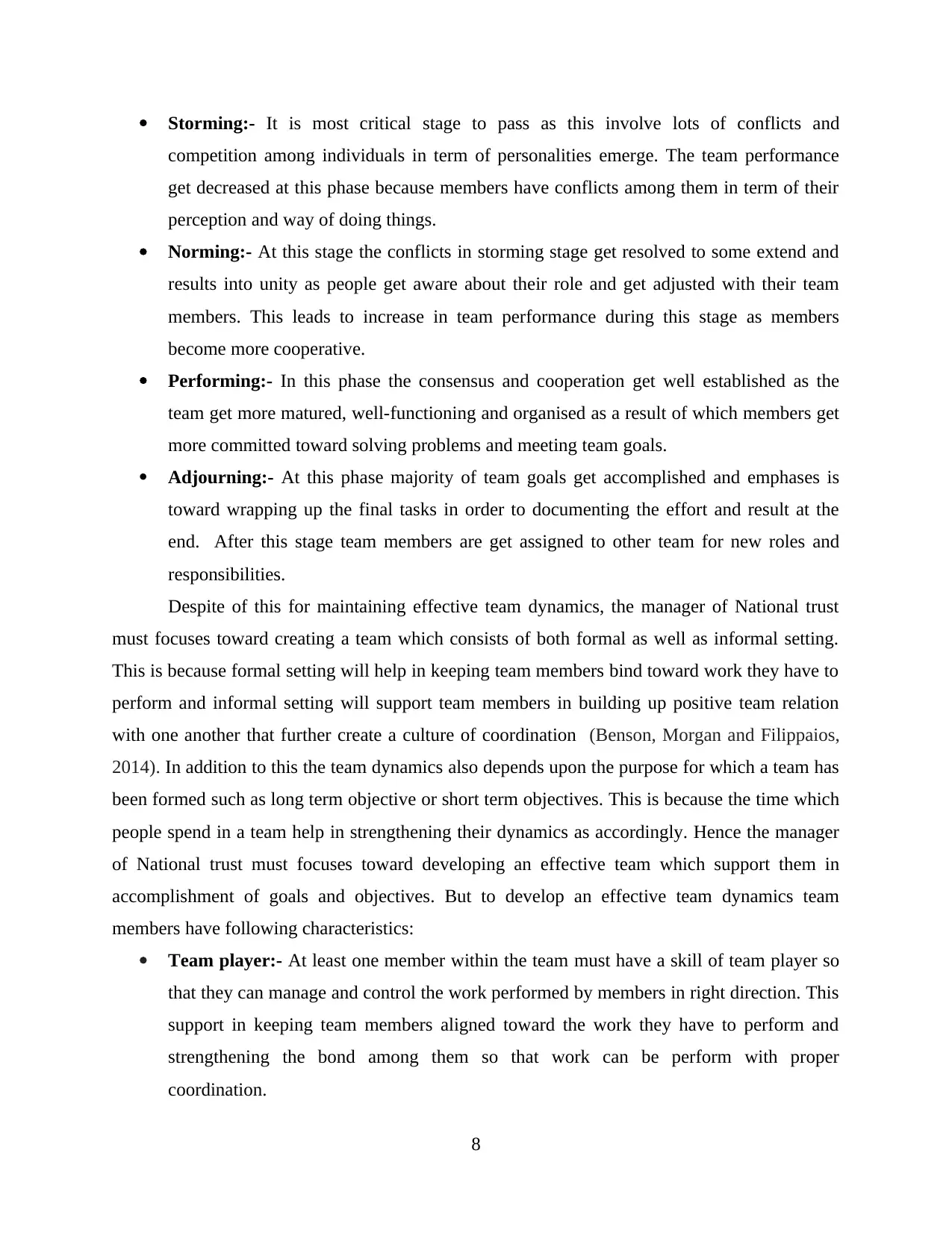
Storming:- It is most critical stage to pass as this involve lots of conflicts and
competition among individuals in term of personalities emerge. The team performance
get decreased at this phase because members have conflicts among them in term of their
perception and way of doing things.
Norming:- At this stage the conflicts in storming stage get resolved to some extend and
results into unity as people get aware about their role and get adjusted with their team
members. This leads to increase in team performance during this stage as members
become more cooperative.
Performing:- In this phase the consensus and cooperation get well established as the
team get more matured, well-functioning and organised as a result of which members get
more committed toward solving problems and meeting team goals.
Adjourning:- At this phase majority of team goals get accomplished and emphases is
toward wrapping up the final tasks in order to documenting the effort and result at the
end. After this stage team members are get assigned to other team for new roles and
responsibilities.
Despite of this for maintaining effective team dynamics, the manager of National trust
must focuses toward creating a team which consists of both formal as well as informal setting.
This is because formal setting will help in keeping team members bind toward work they have to
perform and informal setting will support team members in building up positive team relation
with one another that further create a culture of coordination (Benson, Morgan and Filippaios,
2014). In addition to this the team dynamics also depends upon the purpose for which a team has
been formed such as long term objective or short term objectives. This is because the time which
people spend in a team help in strengthening their dynamics as accordingly. Hence the manager
of National trust must focuses toward developing an effective team which support them in
accomplishment of goals and objectives. But to develop an effective team dynamics team
members have following characteristics:
Team player:- At least one member within the team must have a skill of team player so
that they can manage and control the work performed by members in right direction. This
support in keeping team members aligned toward the work they have to perform and
strengthening the bond among them so that work can be perform with proper
coordination.
8
competition among individuals in term of personalities emerge. The team performance
get decreased at this phase because members have conflicts among them in term of their
perception and way of doing things.
Norming:- At this stage the conflicts in storming stage get resolved to some extend and
results into unity as people get aware about their role and get adjusted with their team
members. This leads to increase in team performance during this stage as members
become more cooperative.
Performing:- In this phase the consensus and cooperation get well established as the
team get more matured, well-functioning and organised as a result of which members get
more committed toward solving problems and meeting team goals.
Adjourning:- At this phase majority of team goals get accomplished and emphases is
toward wrapping up the final tasks in order to documenting the effort and result at the
end. After this stage team members are get assigned to other team for new roles and
responsibilities.
Despite of this for maintaining effective team dynamics, the manager of National trust
must focuses toward creating a team which consists of both formal as well as informal setting.
This is because formal setting will help in keeping team members bind toward work they have to
perform and informal setting will support team members in building up positive team relation
with one another that further create a culture of coordination (Benson, Morgan and Filippaios,
2014). In addition to this the team dynamics also depends upon the purpose for which a team has
been formed such as long term objective or short term objectives. This is because the time which
people spend in a team help in strengthening their dynamics as accordingly. Hence the manager
of National trust must focuses toward developing an effective team which support them in
accomplishment of goals and objectives. But to develop an effective team dynamics team
members have following characteristics:
Team player:- At least one member within the team must have a skill of team player so
that they can manage and control the work performed by members in right direction. This
support in keeping team members aligned toward the work they have to perform and
strengthening the bond among them so that work can be perform with proper
coordination.
8
Paraphrase This Document
Need a fresh take? Get an instant paraphrase of this document with our AI Paraphraser
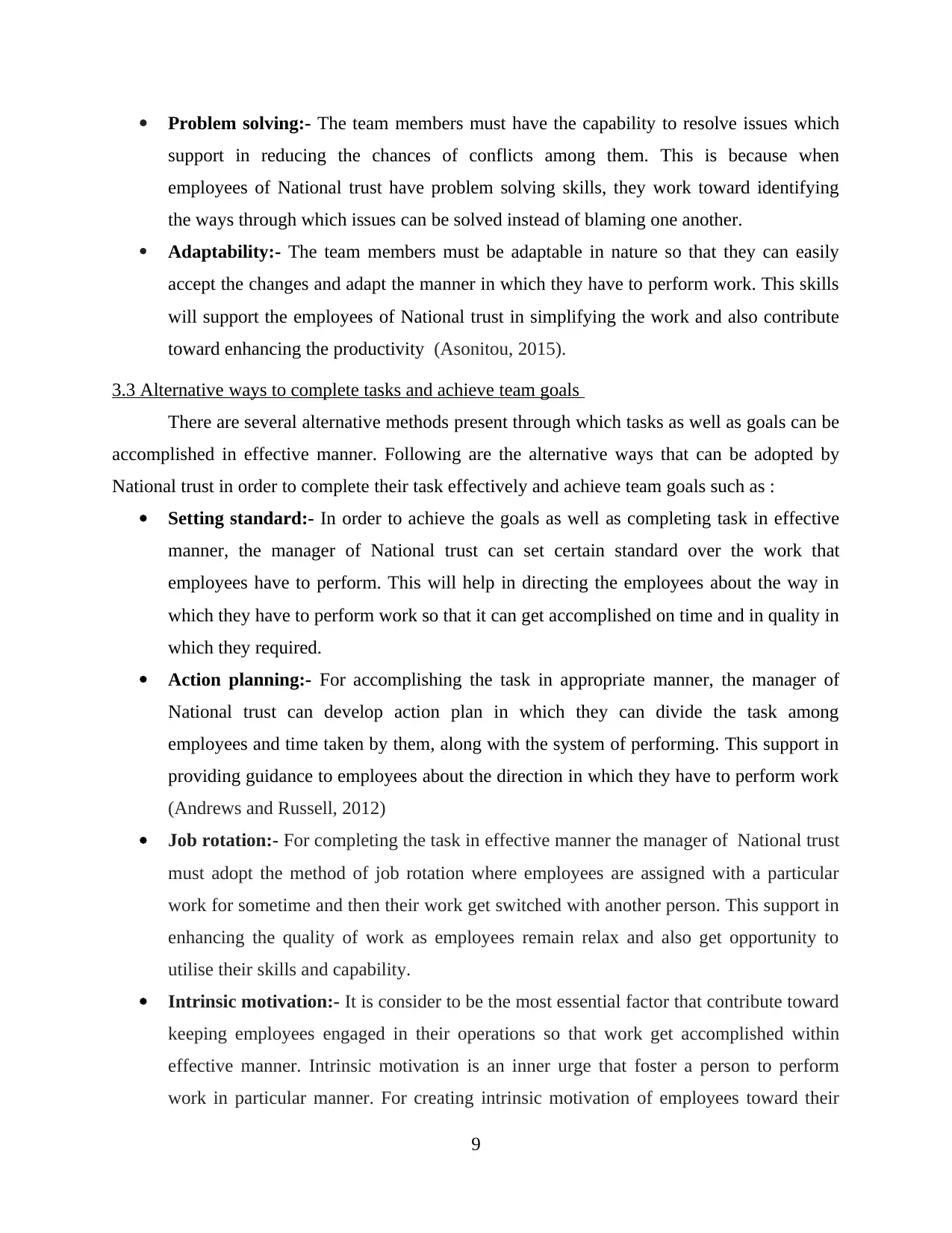
Problem solving:- The team members must have the capability to resolve issues which
support in reducing the chances of conflicts among them. This is because when
employees of National trust have problem solving skills, they work toward identifying
the ways through which issues can be solved instead of blaming one another.
Adaptability:- The team members must be adaptable in nature so that they can easily
accept the changes and adapt the manner in which they have to perform work. This skills
will support the employees of National trust in simplifying the work and also contribute
toward enhancing the productivity (Asonitou, 2015).
3.3 Alternative ways to complete tasks and achieve team goals
There are several alternative methods present through which tasks as well as goals can be
accomplished in effective manner. Following are the alternative ways that can be adopted by
National trust in order to complete their task effectively and achieve team goals such as :
Setting standard:- In order to achieve the goals as well as completing task in effective
manner, the manager of National trust can set certain standard over the work that
employees have to perform. This will help in directing the employees about the way in
which they have to perform work so that it can get accomplished on time and in quality in
which they required.
Action planning:- For accomplishing the task in appropriate manner, the manager of
National trust can develop action plan in which they can divide the task among
employees and time taken by them, along with the system of performing. This support in
providing guidance to employees about the direction in which they have to perform work
(Andrews and Russell, 2012)
Job rotation:- For completing the task in effective manner the manager of National trust
must adopt the method of job rotation where employees are assigned with a particular
work for sometime and then their work get switched with another person. This support in
enhancing the quality of work as employees remain relax and also get opportunity to
utilise their skills and capability.
Intrinsic motivation:- It is consider to be the most essential factor that contribute toward
keeping employees engaged in their operations so that work get accomplished within
effective manner. Intrinsic motivation is an inner urge that foster a person to perform
work in particular manner. For creating intrinsic motivation of employees toward their
9
support in reducing the chances of conflicts among them. This is because when
employees of National trust have problem solving skills, they work toward identifying
the ways through which issues can be solved instead of blaming one another.
Adaptability:- The team members must be adaptable in nature so that they can easily
accept the changes and adapt the manner in which they have to perform work. This skills
will support the employees of National trust in simplifying the work and also contribute
toward enhancing the productivity (Asonitou, 2015).
3.3 Alternative ways to complete tasks and achieve team goals
There are several alternative methods present through which tasks as well as goals can be
accomplished in effective manner. Following are the alternative ways that can be adopted by
National trust in order to complete their task effectively and achieve team goals such as :
Setting standard:- In order to achieve the goals as well as completing task in effective
manner, the manager of National trust can set certain standard over the work that
employees have to perform. This will help in directing the employees about the way in
which they have to perform work so that it can get accomplished on time and in quality in
which they required.
Action planning:- For accomplishing the task in appropriate manner, the manager of
National trust can develop action plan in which they can divide the task among
employees and time taken by them, along with the system of performing. This support in
providing guidance to employees about the direction in which they have to perform work
(Andrews and Russell, 2012)
Job rotation:- For completing the task in effective manner the manager of National trust
must adopt the method of job rotation where employees are assigned with a particular
work for sometime and then their work get switched with another person. This support in
enhancing the quality of work as employees remain relax and also get opportunity to
utilise their skills and capability.
Intrinsic motivation:- It is consider to be the most essential factor that contribute toward
keeping employees engaged in their operations so that work get accomplished within
effective manner. Intrinsic motivation is an inner urge that foster a person to perform
work in particular manner. For creating intrinsic motivation of employees toward their
9
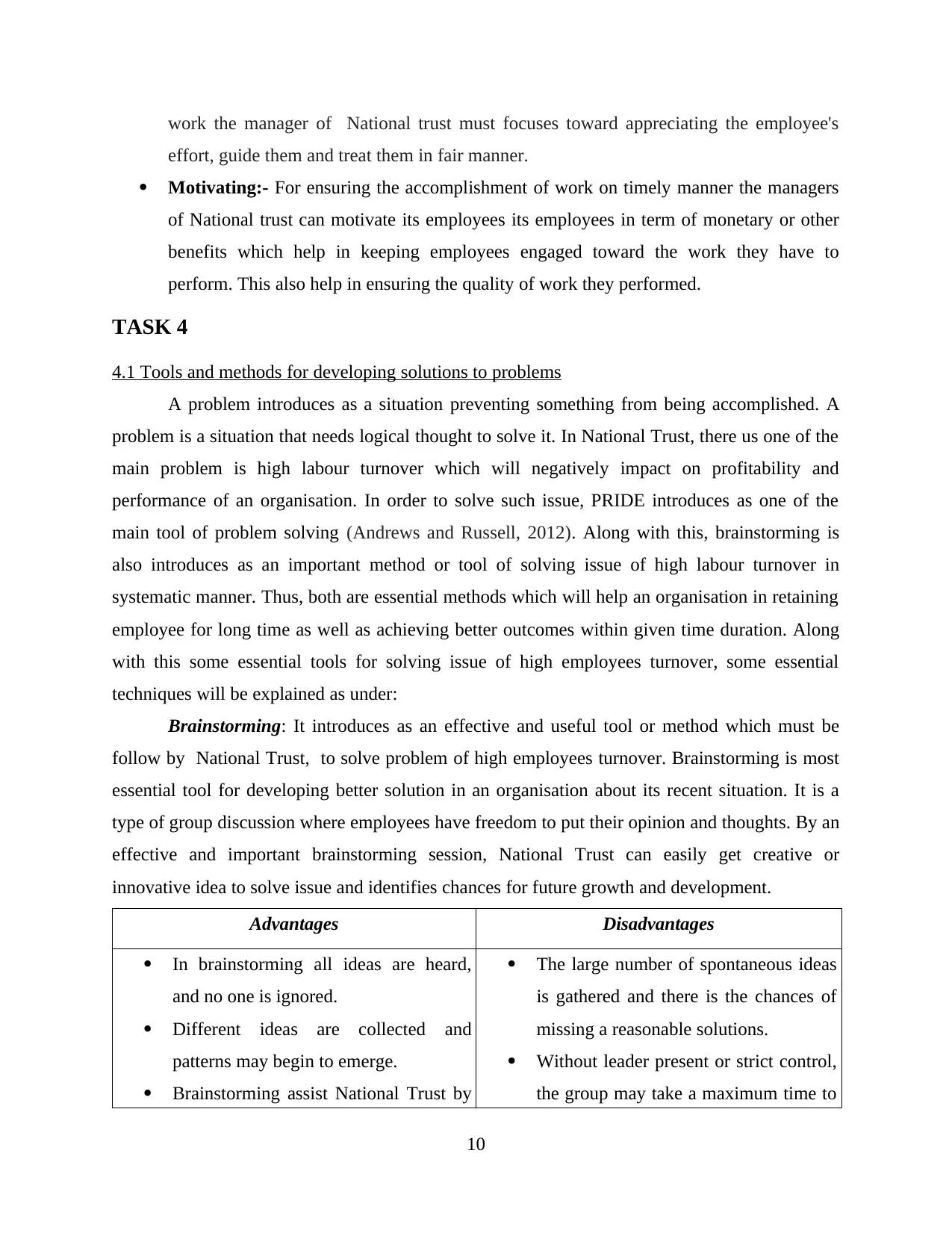
work the manager of National trust must focuses toward appreciating the employee's
effort, guide them and treat them in fair manner.
Motivating:- For ensuring the accomplishment of work on timely manner the managers
of National trust can motivate its employees its employees in term of monetary or other
benefits which help in keeping employees engaged toward the work they have to
perform. This also help in ensuring the quality of work they performed.
TASK 4
4.1 Tools and methods for developing solutions to problems
A problem introduces as a situation preventing something from being accomplished. A
problem is a situation that needs logical thought to solve it. In National Trust, there us one of the
main problem is high labour turnover which will negatively impact on profitability and
performance of an organisation. In order to solve such issue, PRIDE introduces as one of the
main tool of problem solving (Andrews and Russell, 2012). Along with this, brainstorming is
also introduces as an important method or tool of solving issue of high labour turnover in
systematic manner. Thus, both are essential methods which will help an organisation in retaining
employee for long time as well as achieving better outcomes within given time duration. Along
with this some essential tools for solving issue of high employees turnover, some essential
techniques will be explained as under:
Brainstorming: It introduces as an effective and useful tool or method which must be
follow by National Trust, to solve problem of high employees turnover. Brainstorming is most
essential tool for developing better solution in an organisation about its recent situation. It is a
type of group discussion where employees have freedom to put their opinion and thoughts. By an
effective and important brainstorming session, National Trust can easily get creative or
innovative idea to solve issue and identifies chances for future growth and development.
Advantages Disadvantages
In brainstorming all ideas are heard,
and no one is ignored.
Different ideas are collected and
patterns may begin to emerge.
Brainstorming assist National Trust by
The large number of spontaneous ideas
is gathered and there is the chances of
missing a reasonable solutions.
Without leader present or strict control,
the group may take a maximum time to
10
effort, guide them and treat them in fair manner.
Motivating:- For ensuring the accomplishment of work on timely manner the managers
of National trust can motivate its employees its employees in term of monetary or other
benefits which help in keeping employees engaged toward the work they have to
perform. This also help in ensuring the quality of work they performed.
TASK 4
4.1 Tools and methods for developing solutions to problems
A problem introduces as a situation preventing something from being accomplished. A
problem is a situation that needs logical thought to solve it. In National Trust, there us one of the
main problem is high labour turnover which will negatively impact on profitability and
performance of an organisation. In order to solve such issue, PRIDE introduces as one of the
main tool of problem solving (Andrews and Russell, 2012). Along with this, brainstorming is
also introduces as an important method or tool of solving issue of high labour turnover in
systematic manner. Thus, both are essential methods which will help an organisation in retaining
employee for long time as well as achieving better outcomes within given time duration. Along
with this some essential tools for solving issue of high employees turnover, some essential
techniques will be explained as under:
Brainstorming: It introduces as an effective and useful tool or method which must be
follow by National Trust, to solve problem of high employees turnover. Brainstorming is most
essential tool for developing better solution in an organisation about its recent situation. It is a
type of group discussion where employees have freedom to put their opinion and thoughts. By an
effective and important brainstorming session, National Trust can easily get creative or
innovative idea to solve issue and identifies chances for future growth and development.
Advantages Disadvantages
In brainstorming all ideas are heard,
and no one is ignored.
Different ideas are collected and
patterns may begin to emerge.
Brainstorming assist National Trust by
The large number of spontaneous ideas
is gathered and there is the chances of
missing a reasonable solutions.
Without leader present or strict control,
the group may take a maximum time to
10
⊘ This is a preview!⊘
Do you want full access?
Subscribe today to unlock all pages.

Trusted by 1+ million students worldwide
1 out of 18
Related Documents
Your All-in-One AI-Powered Toolkit for Academic Success.
+13062052269
info@desklib.com
Available 24*7 on WhatsApp / Email
![[object Object]](/_next/static/media/star-bottom.7253800d.svg)
Unlock your academic potential
Copyright © 2020–2026 A2Z Services. All Rights Reserved. Developed and managed by ZUCOL.



